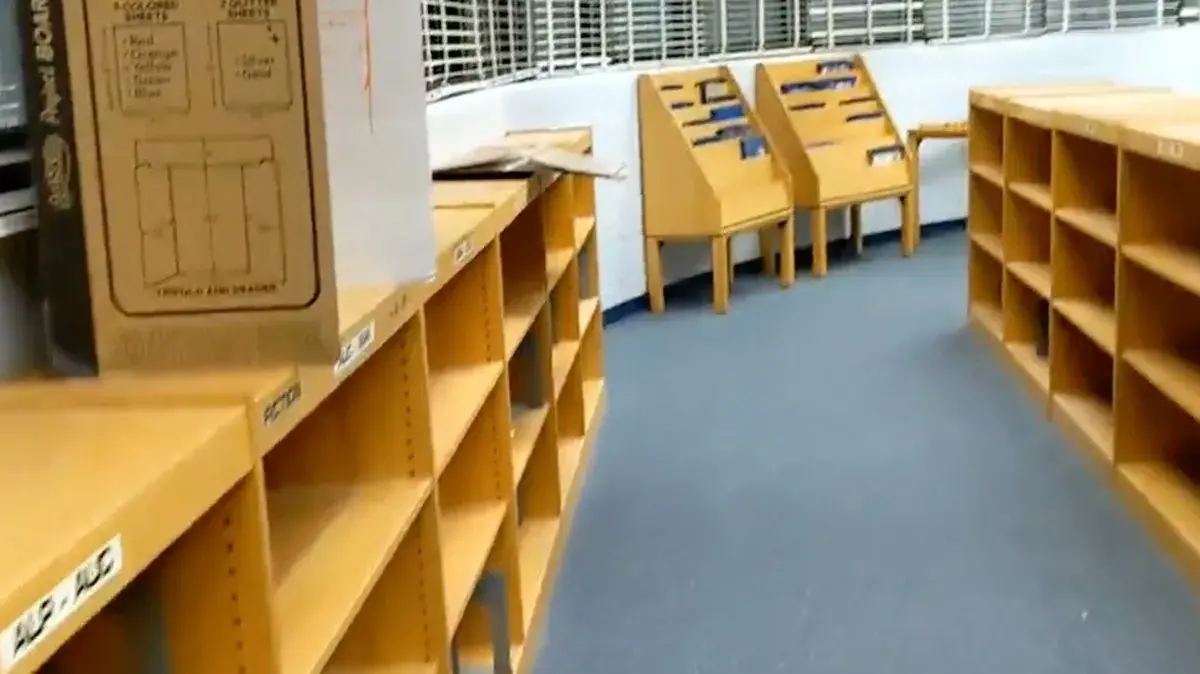Florida Book Bans: Why Are There Empty Shelves in Florida Schools?

Image shared on Twitter by @JagsFanBrian.
You may have seen pictures of empty bookshelves in Florida classrooms, or heard about book bans across the state.
While efforts to remove books have been intensifying for the past year, what’s happening now is that new laws passed last year in Florida are having a clear chilling effect on classroom teachers and librarians. School districts are interpreting the laws differently, but some teachers have been told they must suspend access to their classroom libraries, so each book can be vetted by a media specialist for approval first. If they don’t comply, they could risk losing their teaching license or even being charged with a felony, if they are found in violation of one of these new laws.
For the most part, nobody knows what is being lost from the shelves, because so many books have been removed at once.
“It’s a bleak situation in parts of Florida. We’ve got teachers teaching on eggshells, in classrooms with no books,” said Jonathan Friedman, PEN America’s director of Free Expression and Education programs.
When books were taken away at one school, “the kids began crying and writing letters to the principal, saying, ‘Please don’t take my books, please don’t do this,’” a board member of the Florida Association for Media in Education told the Washington Post.
These are the laws behind the empty shelves:
- HB 1557: The “Parental Rights in Education Act” (a.k.a. “Don’t Say Gay” law) bars classroom instruction on sexual orientation or gender identity in Kindergarten through third grade. In older grades, these topics must be delivered in an “age-appropriate” or “developmentally appropriate” way, and only “in accordance with state standards.” Whether the law applies to school libraries or classroom libraries has been a source of confusion; yet teachers found in violation of the law risk losing their professional license.
- HB 7: The “Stop W.O.K.E.” Act prohibits teaching someone that they must feel guilt or psychological distress on account of their race or sex, similar to educational gag orders with lists of “divisive concepts” passed in numerous states in 2021 and 2022.
- HB 1467 mandates that schools maintain online databases of every book in their collections “in a searchable format,” and that these books must be determined not to contain pornography or material deemed harmful to minors, according to a librarian or media specialist. A recent training released by the Florida Board of Education encourages media specialists to “err on the side of caution” in this vetting process. The law stipulates that parents can challenge any of these materials, to petition to have them removed from schools. In October, the Florida Department of Education clarified that the law applies to any collection of books in a school, including classroom libraries.
These three laws have each led teachers, media specialists, and school administrators to remove books from shelves. In October, the Florida Board of Education also passed new rules that go beyond the language in the laws, to stipulate that teachers found in violation of HB 1557 or HB 7 could have their professional teaching certification revoked. Fear of violating the vague laws has been reason enough to ban titles that might even come close to these prohibitions.
HB1467 works in tandem, providing the mechanism by which parents or citizens who are censorship-minded can scrutinize school collections for books with topics they disfavor, books they feel are not age-appropriate, or books they feel violate these laws.
In this environment, teachers in Manatee County and Duval County were told they had to have each book in their classrooms reviewed, following the provisions of HB 1467. Until their books are approved by a media specialist, teachers were told to remove or cover their books.
One high school student in Manatee told the New Yorker, “I’m scared they’re going to take my one history book away.” In Duval, a media specialist described to The Independent, a “sad sight” of students walking by an empty, closed library unable to access books, until she reviews 37,000 of them. The process, she explained, is challenging and subjective: “The phrase ‘harmful to children’ is so vague… It used to just encompass pornography. They have now added excessive violence. They’ve added negative language. Just they have snuck so many little things underneath harmful to children, it just seems like they’re trying to catch us making a mistake.”
A spokesperson for Manatee said last week that they are “adhering to the guidance of the Florida Department of Education.” And in Duval, a spokesperson said that they are “taking the steps required to comply with Florida law.”
Significant questions remain about how review criteria are being applied, and what stories are going to be culled from classrooms as a result.






